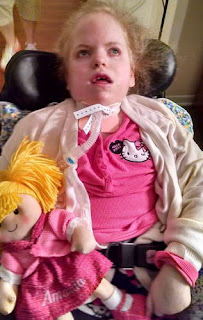What is a Sanfilippo syndrome?
A Sanfilippo syndrome is a genetic disease caused by gene deformity. It is also a metabolic and neurodegenerative disease. It is a metabolic disease in the sense that the body cannot break down mucopolysaccharides or glycosaminoglycans.
It is a neurodegenerative disease in the sense that it primarily affects the central nervous system. Over time, it damages the brain causing cognitive-related symptoms such as loss of speech, hyperactivity, seizures, sleeplessness, mental retardation, dementia, and death. (1, 2, and 3)
Help and support should be given on a day to day basis. There is an emerging treatment called gene therapy, which aims to correct genetic mutation by inserting healthy genes into the cells of the patient. However, this treatment approach is quite new and is still being tested in a small number of people. (7, 8, 9, and 10)
References
It is a neurodegenerative disease in the sense that it primarily affects the central nervous system. Over time, it damages the brain causing cognitive-related symptoms such as loss of speech, hyperactivity, seizures, sleeplessness, mental retardation, dementia, and death. (1, 2, and 3)
picture 1: A child diagnosed with Sanfilippo syndrome.
image source: teamsanfilippo.org
picture 2: Sanfilippo syndrome is a genetic disease that runs in the family.
image source: curesff.org
picture 3: Sanfilippo syndrome is a progressive disease as seen in the photos.
image source: encrypted-tbn0.gstatic.com
picture 4: Sanfilippo syndrome may go unnoticed at an early stage, which leads to misdiagnosis.
image source: i.dailymail.co.uk
picture 5: Pallative care is given to patient with Sanfilippo syndrome.
image source: cdn.newsapi.com.au
Sanfilippo syndrome symptoms
Sanfilippo is a cunning condition. It can go undetected for years. In fact, many people who have Sanfilippo were born without visible signs and symptoms. Clinical manifestations start to show up when the child is in the preschool stage. Most of the time, the disease is mistaken for other disease condition. The signs and symptoms of Sanfilippo syndrome are broken down int stages. (3, 4)- Stage 1 - The child's speaking ability is delayed. There is a mild facial abnormality and behavioral problem. At the early stage of Sanfilippo, the child is often incorrectly diagnosed of autism. Other noticeable signs and symptoms include chipped teeth, recurrent cavity, headache secondary to accummulation of fluid pressure on the brain, noticeable large head, and mild bone deformity such as flared ribs. (4, 5)
- Stage 2 - At this stage, the child becomes overactive, which comes up with a diagnosis of ADHD (attention deficit hyperactivity disorder). The child demonstrates difficult behavior and is restless and sleepless.The child screams even when not triggered. He also has major temper tantrums. (5, 6)
- Stage 3 - At this stage, the classic signs and symptoms of Sanfilippo syndrome are evident. The patient's body literally shuts down. The patient can no longer eat, walk, and talk on his own. He becomes prone to infection such as pneumonia. The quality of life is poor and most likely, the patient dies at this stage. (5, 6)
picture 6: A girl suffering from the devastating effect of Sanfilippo syndrome.
image source: abbygracefoundation.org
picture 7: An eight-year-old boy diagnosed with Sanfilippo syndrome.
image source: www.bradenton.com
picture 8: Clinical features of a boy with Sanfilippo syndrome.
image source: researchgate.net
picture 9: Both children in the family have Sanfilippo syndrome.
image source: newsapi.com.au
picture 10: Teens diagnosed with Sanfilippo syndrome.
image source: www.cubicmobile.com
Sanfilippo syndrome life expectancy
The life expectancy of people with Sanfilippo syndrome is 10 to 20 years. The life expectancy can be shortened or lengthened depending on the care and support given to the patient. The main focus is to improve the quality of life. (6, 7)Sanfilippo syndrome treatment
There is no Sanfilippo syndrome cure develop yet. Medical experts continue to do research and studies to figure out how to cure the disease. The best thing to do with patients suffering from Sanfilippo syndrome is to improve the quality of life.Help and support should be given on a day to day basis. There is an emerging treatment called gene therapy, which aims to correct genetic mutation by inserting healthy genes into the cells of the patient. However, this treatment approach is quite new and is still being tested in a small number of people. (7, 8, 9, and 10)
References
- https://en.wikipedia.org/wiki/Sanfilippo_syndrome
- https://medlineplus.gov/ency/article/001210.htm
- https://www.sanfilippo.org.au/page/26/what-is-sanfilippo
- http://www.phoenixnestbiotech.com/about-sanfilippo-syndrome/
- https://raremark.com/sanfilippo-syndrome-mps-iii/articles/signs-symptoms--704
- https://emedicine.medscape.com/article/948540-overview
- http://teamsanfilippo.org/what-is-sanfilippo-syndrome
- https://www.disabled-world.com/disability/types/sanfilippo-syndrome.php
- https://rarediseases.org/rare-diseases/mucopolysaccharidosis-type-iii/
- http://www.socialstyrelsen.se/rarediseases/sanfilipposyndrome











